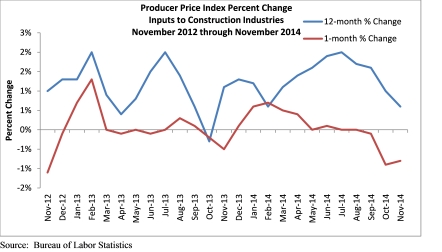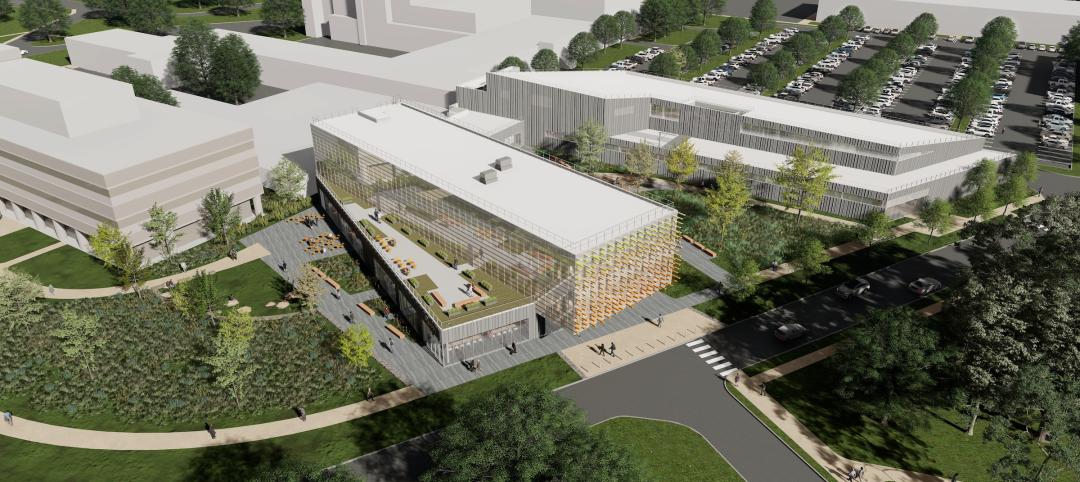Construction input prices dipped 1.4% during the final month of 2014 and are down nearly 1% on a year-over-year basis, according to the Jan. 15 producer price index release from the U.S. Department of Labor.
Inputs to nonresidential construction fell even further, down 1.7% for the month and 1.9% year over year. December's report marks the sharpest decline in input prices since late 2008 during the global financial crisis and the fifth consecutive month construction materials prices have failed to rise.
"Without question, financial markets have been unnerved by the recent declines in oil, copper and other commodity prices, although that jitteriness does not necessarily imply a serious economic problem in America," said Associated Builders and Contractors Chief Economist Anirban Basu. "The fact is the U.S. economy has performed handsomely over the past nine months, according to most metrics, and conventional wisdom suggests that it can continue to expand at or above trend rates of growth despite economic weakening in Europe, China and elsewhere. This is further evidenced by the World Bank's recent downgrade of its forecasts for global growth in 2015 and 2016, while it upgraded its outlook for the United States.
"Overall, the view that U.S. domestic demand for construction services and most other services continues to expand is consistent with the fact that some domestically produced and consumed materials actually registered price increases last month," said Basu. "Note that concrete prices are up by 5% on a year-over-year basis while natural gas prices are up by 10%."
The following materials prices increased in December:
• Prices for plumbing fixtures expanded 0.1% in December and are up 3.1% on a year-over-year basis.
• Concrete products prices expanded 0.7% in December and are up 5% on a yearly basis.
• Natural gas prices expanded 19.7% in December and are 10% higher than one year ago.
• Fabricated structural metal product prices grew 0.3% for the month and have expanded 1.5% on a year-over-year basis.
• Seven of the 11 key construction inputs did not experience price increases for the month.
• Iron and steel prices fell 1% in December and are down 3.9% from the same time last year.
• Nonferrous wire and cable prices fell 1.6% on a monthly basis and 1.5% on a yearly basis.
• Prices for prepared asphalt, tar roofing, and siding fell 1% for the month but are up 1.9% on a year-ago basis.
• Steel mill products prices fell 1.3% for the month but are 0.4% higher than one year ago.
• Softwood lumber prices fell 1.3% in December but are 0.3% higher than one year ago.
• Crude petroleum prices fell 18.9% in December and are down 37.1% from the same time last year.
• Crude energy materials prices fell 4.7% in December but are 19.6% lower year-over-year.
Related Stories
Women in Design+Construction | May 28, 2024
Commerce Department launches Million Women in Construction Community Pledge
The U.S. Department of Commerce launched its Million Women in Construction Community Pledge this month to boost the ranks of women in construction companies. Federal investments are creating a construction boom that is increasing job opportunities for construction and trade workers.
Laboratories | May 24, 2024
The Department of Energy breaks ground on the Princeton Plasma Innovation Center
In Princeton, N.J., the U.S. Department of Energy’s Princeton Plasma Physics Laboratory (PPPL) has broken ground on the Princeton Plasma Innovation Center (PPIC), a state-of-the-art office and laboratory building. Designed and constructed by SmithGroup, the $109.7 million facility will provide space for research supporting PPPL’s expanded mission into microelectronics, quantum sensors and devices, and sustainability sciences.
MFPRO+ News | May 24, 2024
Austin, Texas, outlaws windowless bedrooms
Austin, Texas will no longer allow developers to build windowless bedrooms. For at least two decades, the city had permitted developers to build thousands of windowless bedrooms.
Resiliency | May 24, 2024
As temperatures underground rise, so do risks to commercial buildings
Heat created by underground structures is increasing the risk of damage to buildings, recent studies have found. Basements, train tunnels, sewers, and other underground systems are making the ground around them warmer, which causes soil, sand, clay and silt to shift, settle, contract, and expand.
Sports and Recreational Facilities | May 23, 2024
The Cincinnati Open will undergo a campus-wide renovation ahead of the expanded 2025 tournament
One of the longest-running tennis tournaments in the country, the Cincinnati Open will add a 2,000-seat stadium, new courts and player center, and more greenspace to create a park-like atmosphere.
Mass Timber | May 22, 2024
3 mass timber architecture innovations
As mass timber construction evolves from the first decade of projects, we're finding an increasing variety of mass timber solutions. Here are three primary examples.
MFPRO+ News | May 21, 2024
Massachusetts governor launches advocacy group to push for more housing
Massachusetts’ Gov. Maura Healey and Lt. Gov. Kim Driscoll have taken the unusual step of setting up a nonprofit to advocate for pro-housing efforts at the local level. One Commonwealth Inc., will work to provide political and financial support for local housing initiatives, a key pillar of the governor’s agenda.
Building Tech | May 21, 2024
In a world first, load-bearing concrete walls built with a 3D printer
A Germany-based construction engineering company says it has constructed the world’s first load-bearing concrete walls built with a 3D printer. Züblin built a new warehouse from a single 3D print for Strabag Baumaschinentechnik International in Stuttgart, Germany using a Putzmeister 3D printer.
MFPRO+ News | May 21, 2024
Baker Barrios Architects announces new leadership roles for multifamily, healthcare design
Baker Barrios Architects announced two new additions to its leadership: Chris Powers, RA, AIA, NCARB, EDAC, as Associate Principal and Director (Healthcare); and Mark Kluemper, AIA, NCARB, as Associate Principal and Technical Director (Multifamily).
MFPRO+ News | May 20, 2024
Florida condo market roiled by structural safety standards law
A Florida law enacted after the Surfside condo tower collapse is causing turmoil in the condominium market. The law, which requires buildings to meet certain structural safety standards, is forcing condo associations to assess hefty fees to make repairs on older properties. In some cases, the cost per unit runs into six figures.

















